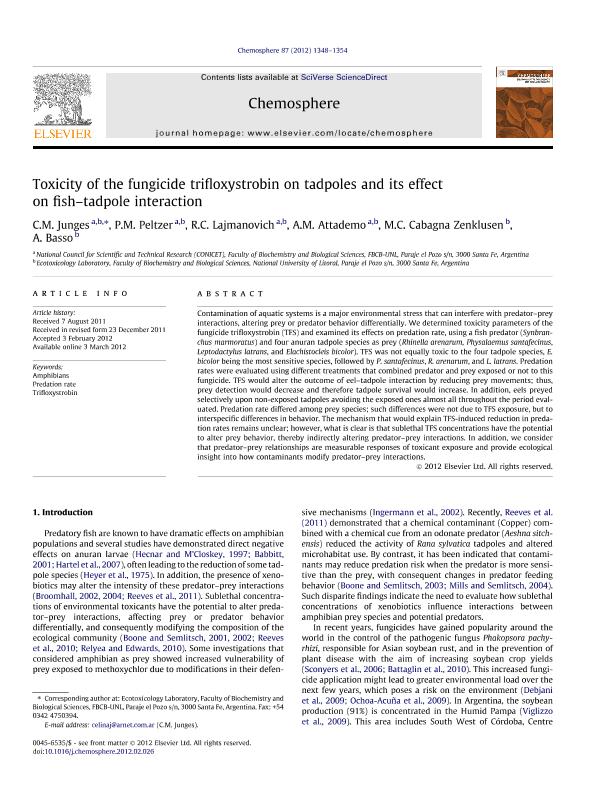Artículo
Toxicity of the fungicide trifloxystrobin on tadpoles and its effect on fish-tadpole interaction
Junges, Celina Maria ; Peltzer, Paola
; Peltzer, Paola ; Lajmanovich, Rafael Carlos
; Lajmanovich, Rafael Carlos ; Attademo, Andres Maximiliano
; Attademo, Andres Maximiliano ; Cabagna Zenklusen, Mariana Cristina; Basso, Agustin
; Cabagna Zenklusen, Mariana Cristina; Basso, Agustin
 ; Peltzer, Paola
; Peltzer, Paola ; Lajmanovich, Rafael Carlos
; Lajmanovich, Rafael Carlos ; Attademo, Andres Maximiliano
; Attademo, Andres Maximiliano ; Cabagna Zenklusen, Mariana Cristina; Basso, Agustin
; Cabagna Zenklusen, Mariana Cristina; Basso, Agustin
Fecha de publicación:
02/2012
Editorial:
Pergamon-Elsevier Science Ltd
Revista:
Chemosphere
ISSN:
0045-6535
Idioma:
Inglés
Tipo de recurso:
Artículo publicado
Clasificación temática:
Resumen
Contamination of aquatic systems is a major environmental stress that can interfere with predator-prey interactions, altering prey or predator behavior differentially. We determined toxicity parameters of the fungicide trifloxystrobin (TFS) and examined its effects on predation rate, using a fish predator (Synbranchus marmoratus) and four anuran tadpole species as prey (Rhinella arenarum, Physalaemus santafecinus, Leptodactylus latrans, and Elachistocleis bicolor). TFS was not equally toxic to the four tadpole species, E. bicolor being the most sensitive species, followed by P. santafecinus, R. arenarum, and L. latrans. Predation rates were evaluated using different treatments that combined predator and prey exposed or not to this fungicide. TFS would alter the outcome of eel-tadpole interaction by reducing prey movements; thus, prey detection would decrease and therefore tadpole survival would increase. In addition, eels preyed selectively upon non-exposed tadpoles avoiding the exposed ones almost all throughout the period evaluated. Predation rate differed among prey species; such differences were not due to TFS exposure, but to interspecific differences in behavior. The mechanism that would explain TFS-induced reduction in predation rates remains unclear; however, what is clear is that sublethal TFS concentrations have the potential to alter prey behavior, thereby indirectly altering predator-prey interactions. In addition, we consider that predator-prey relationships are measurable responses of toxicant exposure and provide ecological insight into how contaminants modify predator-prey interactions.
Palabras clave:
AMPHIBIANS
,
PREDATION RATE
,
TRIFLOXYSTROBIN
Archivos asociados
Licencia
Identificadores
Colecciones
Articulos(CCT - SANTA FE)
Articulos de CTRO.CIENTIFICO TECNOL.CONICET - SANTA FE
Articulos de CTRO.CIENTIFICO TECNOL.CONICET - SANTA FE
Citación
Junges, Celina Maria; Peltzer, Paola; Lajmanovich, Rafael Carlos; Attademo, Andres Maximiliano; Cabagna Zenklusen, Mariana Cristina; et al.; Toxicity of the fungicide trifloxystrobin on tadpoles and its effect on fish-tadpole interaction; Pergamon-Elsevier Science Ltd; Chemosphere; 87; 11; 2-2012; 1348-1354
Compartir
Altmétricas



